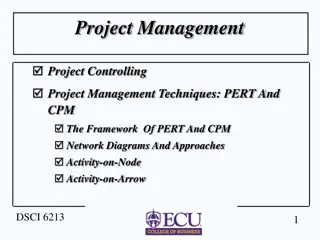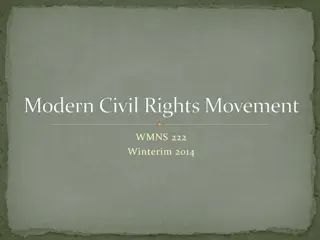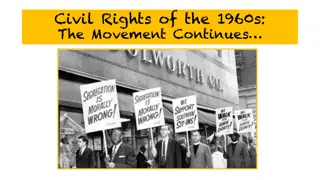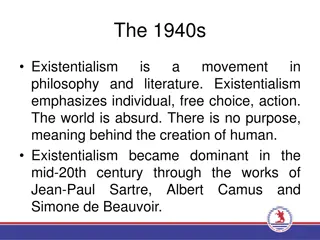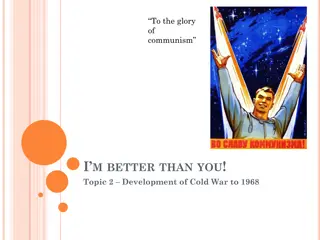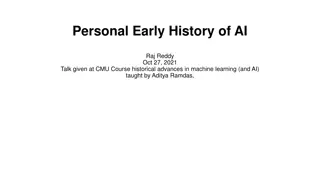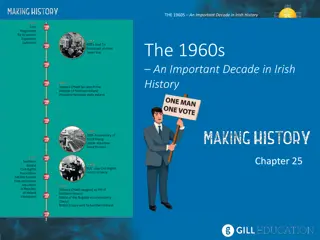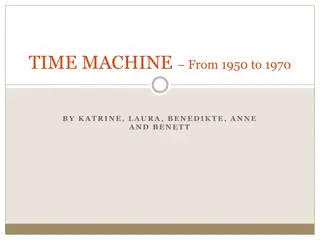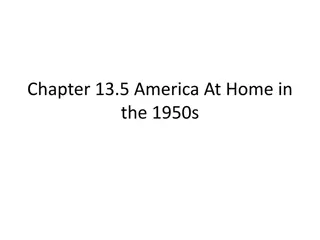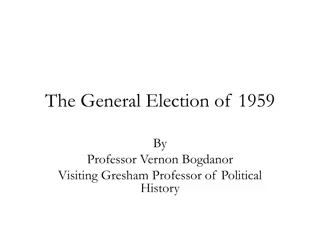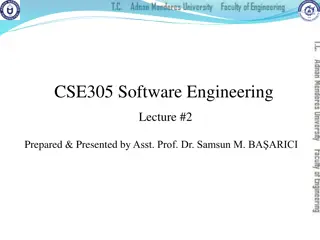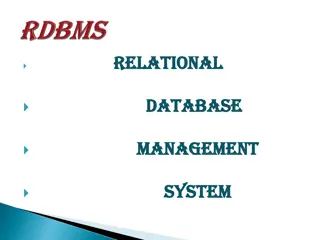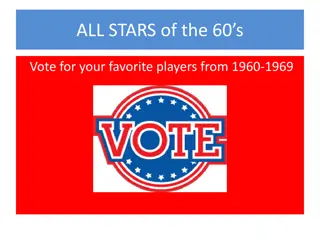Evolution of Radiopharmacy: A Specialized Field in Pharmacy
The evolution of radiopharmacy as a specialty has progressed rapidly since the 1950s, involving the preparation, dispensing, and clinical investigation of radioactive materials as drugs. Radiopharmacy plays a crucial role in the development and use of radiopharmaceuticals for diagnostic, therapeutic
3 views • 53 slides
Evolution of Operating Systems: From Mainframe Computers to Unix
Before the 1950s, users interacted directly with mainframe computers without an operating system, debugging using control panels. The transition to writing programs in symbolic languages led to the need for specific drivers. Run queues and operator-assisted job submissions marked this era. The first
0 views • 41 slides
Understanding Structuralism in Literature: Key Concepts and Evolution
Structuralism, as presented by Dr. B. Kalidoss, explores the order and arrangement in various forms like language and literature. It delves into the interrelationship between units and rules, proposing a deeper understanding of texts through linguistic analysis. The evolution of structuralism in lit
0 views • 17 slides
Social and Political Turmoil in 1960s Australia: A Snapshot
The 1960s in Australia were marked by significant political and social upheaval. Young people challenged traditional values, women fought for equal rights, and citizens protested against issues like the Vietnam War and racism. The era saw a push for change and reform, with pivotal events such as the
0 views • 10 slides
Project Management Techniques: PERT and CPM Overview
Explore the fundamentals of Project Management Techniques, focusing on PERT and CPM. Understand Network Diagrams, Forward and Backward Pass, Critical Path, Project Scheduling, and more. Learn about Gantt Charts, Six Steps of PERT & CPM, and their historical development in the 1950s. Gain insights in
7 views • 14 slides
Exploring Transformational Psychology Through History and Tradition
Transformational psychology delves into the spiritual and emotional transformation required for understanding psychology in the context of faith and relationship with God. It contrasts naturalistic approaches with the spiritual foundation, emphasizing the importance of combining science and psycholo
3 views • 17 slides
Computer Graphics: Evolution and Applications
Computer graphics represent the creation and manipulation of visual information using specialized hardware and software. This field has evolved since the 1950s, enabling diverse applications like entertainment, CAD, education, e-commerce, and computer art. The origins date back to MIT's early displa
1 views • 22 slides
Understanding Project Management Terminology and Techniques
Explore the key concepts and methods in project management, such as expert judgment, analogous estimating, three-point estimates, and critical path analysis. Learn about hidden time factors, activity types, terminology paths, and network flow principles. Gain insights into historical development, in
1 views • 37 slides
Approaches to Study Comparative Politics: Traditional vs. Modern Perspectives
This chapter discusses the importance of approaches in the study of comparative politics, categorizing them into traditional and modern perspectives. Traditional approaches include philosophical, historical, and traditional institutional approaches, highlighting their strengths and limitations. Mode
0 views • 7 slides
Evolution of Operating Systems over the Decades
Operating systems have evolved over the past 50 years through distinct phases, from the early history of primitive machines in the 1940s and 1950s to the development of batch processing systems in the 1960s and multimode time-sharing systems in the 1970s. The 1980s marked the era of personal computi
0 views • 24 slides
Insights into Fahrenheit 451 by Ray Bradbury
Explore the influential novel Fahrenheit 451 by Ray Bradbury, delving into its origins, themes, and relevance in the context of societal criticism, dystopian elements, and historical backdrop of the 1950s. Discover the cautionary tale of censorship, technological advancements, and the impact of tota
0 views • 16 slides
Significant Events of the Modern Civil Rights Movement
The Modern Civil Rights Movement in the 1950s and 1960s was marked by pivotal events that challenged segregation and discrimination in the United States. Key moments such as the Brown v. Board of Education ruling in 1954, the tragic murder of Emmett Till in 1955, Rosa Parks' defiant act sparking the
0 views • 17 slides
Civil Rights Movement of the 1960s: A Historic Journey
The Civil Rights Movement of the 1960s was a pivotal time in American history marked by significant events such as the Freedom Riders, University of Mississippi integration, Birmingham Campaign, March on Washington, Freedom Summer, Civil Rights Act of 1964, Selma to Montgomery March, and the emergen
0 views • 12 slides
Overview of Key Historical Events in Different Decades
Explore significant events and movements from various decades in American history, ranging from the 1600s to the 1970s. From the 1960s' Freedom Summer and sit-ins to the 1880s' pragmatism, delve into the social, political, and cultural milestones that shaped the nation. The journey continues through
0 views • 52 slides
Ken Ludwig's Leading Ladies - A Comedy of Cross-Dressing and Deception
Jack and Leo, two Shakespearean actors, pretend to be women to secure an elderly woman's fortune, leading to comedic chaos. As they navigate deceit, love, and betrayal in the 1950s setting, their desire for more causes complications and unexpected twists, especially when Leo falls for the woman's ni
1 views • 13 slides
Literary Movements in the 1940s and 1950s: Existentialism to Angry Young Man
Existentialism emerged as a dominant philosophy in the 1940s, emphasizing individualism and the absurdity of the world. Writers like Samuel Beckett and Iris Murdoch explored these themes in their notable works. In the following decade, the Angry Young Man Movement took hold, challenging societal nor
2 views • 12 slides
America in the 1960s: Soul, Beauty, and Empowerment
The 1960s in America was a decade marked by significant social and cultural movements. Icons such as Martin Luther King Jr., Malcolm X, and Muhammad Ali played pivotal roles in advocating for civil rights and empowerment. The era also saw the rise of soul music pioneers like Sam Cooke and Marvin Gay
0 views • 15 slides
The Cold War Rivalry: 1950s-1960s Espionage and Arms Race
The period from the 1950s to the 1960s was marked by intense competition between the Soviet Union and the US in the realms of espionage, space exploration, and nuclear armament. The Cold War rivalry led to significant advancements in technology and heightened tensions, culminating in key events like
0 views • 7 slides
The Rich History of Argentine Comics: From Golden Age to Modern Times
Argentina boasts a rich tradition of comics, with iconic figures and writers comparable to those of New York and Paris. The development of comics in Argentina can be traced back to the 19th century, evolving from single-panel political satire to magazine and newspaper formats. The Golden Age of Arge
0 views • 16 slides
Post-War Reflections: Voices and Identities of the 1950s and 1960s
Exploring the themes of post-war literature from the 1950s and 1960s, this analysis delves into the tensions, crises, and identities shaped by the era. Writers of the time grapple with finding a voice that reflects the uncertainty of a changing world order, encompassing disillusionment, anger, and i
0 views • 16 slides
Exploring L=A=N=G=U=A=G=E Poetry Movement of the Late 1960s and 1970s
The L=A=N=G=U=A=G=E poetry movement emerged in the late 1960s and early 1970s as a response to mainstream American poetry, focusing on diverse communities in San Francisco and New York. This avant-garde movement emphasized the use of language, drawing readers' attention to the nuances of meaning. No
0 views • 6 slides
Explore 1960s Slang: Words and Phrases That Shaped a Generation
Delve into the fascinating world of 1960s slang, where words like "chill," "cool," and "groovy" became iconic expressions. Discover the distinct language that defined a generation, still resonating in modern speech. From "Chinese fire drill" to "far out," these colorful phrases reflect the vibrant c
1 views • 9 slides
Civil Rights in the 1960s: Key Events and Figures
Explore the pivotal moments of the Civil Rights movement in the 1960s, including sit-ins, Freedom Rides, the struggles at Ole Miss and Birmingham, and the impactful march in Alabama. Witness the courage and determination of activists fighting for equality and justice during this transformative era o
1 views • 10 slides
The Nixon Administration: Politics and Economics in the 1960s
The Nixon Administration in the 1960s appealed to Middle America with promises of restoring order and appealing to conservative values. Nixon's Southern Strategy, focus on law and order, implementation of the New Federalism program, and attempts to reform welfare systems were key aspects of his pres
0 views • 13 slides
DNA Discovery and Structure Milestones
In the fascinating journey of understanding DNA, key discoveries by scientists such as Johann Miescher, Frederick Griffith, and Oswald Avery paved the way for grasping DNA's role as the genetic material. The discovery of DNA's structure as the blueprint for living organisms, composed of nucleotides
0 views • 28 slides
Early History of AI: Reflections on 1960s Innovations and Projects
Explore the early history of AI through reflections on the advancements and projects from the 1960s. Delve into key developments in robotics, computer vision, knowledge engineering, speech and language understanding, and more. Learn about pioneering initiatives like The Hand Eye Project, Image Analy
0 views • 36 slides
The 1960s in Irish History: A Decade of Transformation
The 1960s marked a pivotal period in Irish history with significant changes in economic policy, education, and societal norms. The era saw the publication of the first Programme for Economic Development, the establishment of Teilifís Éireann (RTÉ), and the visit of President Kennedy to Ireland. N
0 views • 15 slides
Exploring the Evolution of Life and Culture from 1950 to 1970
Journey through the transformative decades of the 1950s to the 1970s, witnessing changes in family dynamics, fashion trends, furniture designs, technology advancements, music evolution, and significant global events such as the Cold War and iconic moments like the coronation of Queen Elizabeth II. D
0 views • 10 slides
European Defence Treaty Negotiations in the 1950s
In the 1950s, the proposal for a European Defence Treaty faced challenges and differing opinions among European countries and the USA. The Korean War, fears of Soviet threat, and the role of NATO influenced discussions. The evolution of negotiations, including debates on West German rearmament and t
0 views • 6 slides
Comparative Study of Noir Elements in Blade Runner and Classic Films
Explore the neo-noir style in Blade Runner compared to classic film noirs of the 1940s and 1950s. Understand the dark, bleak, and shadowy set designs, psychological explorations, and societal themes that characterize these films. Compare Blade Runner with iconic films like Double Indemnity and Sin C
0 views • 22 slides
Overview of Civil Rights Movement and Key Federal Laws
The Civil Rights Movement of the 1950s and 1960s aimed to secure rights for African Americans through civil disobedience, leading to landmark events like Rosa Parks' protest and Martin Luther King Jr.'s iconic speeches. Federal laws, such as the Civil Rights Acts of 1957, 1960, 1964, and 1968, were
0 views • 10 slides
Exploring Commodity Frontiers and Urbanization in Brazilian Cinema and Literature
The texts "Inferno" by Patricia Melo and "City of God" directed by Fernando Meirelles and Kátia Lund depict the shaping of Rio's history by commodity frontier movements in Brazil. These movements include the migration of people to cities due to agricultural crises, emergence of drug trade, particul
0 views • 19 slides
Understanding Ground-Level Ozone Pollution: Health Effects and Historical Perspective
Ground-level ozone, a secondary pollutant formed by NOx and VOCs, poses significant health risks such as lung inflammation and respiratory illnesses. This article delves into the adverse effects of ozone inhalation, regulatory efforts, and a historical perspective, including the alarming levels reco
0 views • 24 slides
The 1950s in America: Post-War Prosperity and Social Changes
America in the 1950s experienced a period of post-war prosperity marked by a significant increase in consumer culture, suburban growth, and corporate life changes. The era saw a booming economy, the Baby Boom generation, suburban expansion, and shifts in gender roles. However, challenges such as rac
0 views • 18 slides
Utilization of Algae for Biofuels Production: A Comprehensive Overview
Algae, both microalgae and macroalgae, hold immense potential as sources of biofuels due to their high productivity and adaptability. Microalgae, in particular, are highlighted for their rapid growth rates and efficient photosynthesis, making them ideal for mass production with minimal land and wate
0 views • 31 slides
General Elections of the 1950s: A Political Overview
The General Elections of the 1950s saw significant shifts in power between the Conservative and Labour parties in the UK. In 1951, the Conservatives narrowly won over Labour, while in 1955 and 1959, they secured more decisive victories. The swing towards the Conservatives in each election reflects c
0 views • 4 slides
Modern Approach to Systems Analysis and Design in Software Engineering
This lecture covers various topics in software engineering, including system analysis and design, software process models, system development life cycle, coping with change, and process improvement. It discusses the software process, process activities, software process models, and software process
0 views • 91 slides
Evolution of Database Management Systems
The evolution of Database Management Systems (DBMS) began with file systems and punched cards in the 1950s, followed by hierarchical and network models in the 1960s and 1970s. The 1980s introduced relational databases like Ingres, Oracle, DB2, and Sybase. The 1990s saw the rise of object-oriented an
0 views • 31 slides
Development of Community Psychology in the 1960s: A Historical Perspective
The development of Community Psychology in the 1960s was influenced by social and political movements such as the Civil Rights Movement, the Feminist Movement, and the deinstitutionalization of mental patients. This period saw the establishment of community-based mental health services and the birth
0 views • 9 slides
Vote for Your Favorite Baseball Stars from the 1960s
Get nostalgic and vote for your favorite baseball players from the 1960s! From legendary catchers to dominant pitchers and powerful hitters, relive the golden era of baseball with iconic players like Mickey Mantle, Hank Aaron, Sandy Koufax, and more. Choose your All-Star lineup from this star-studde
0 views • 11 slides




